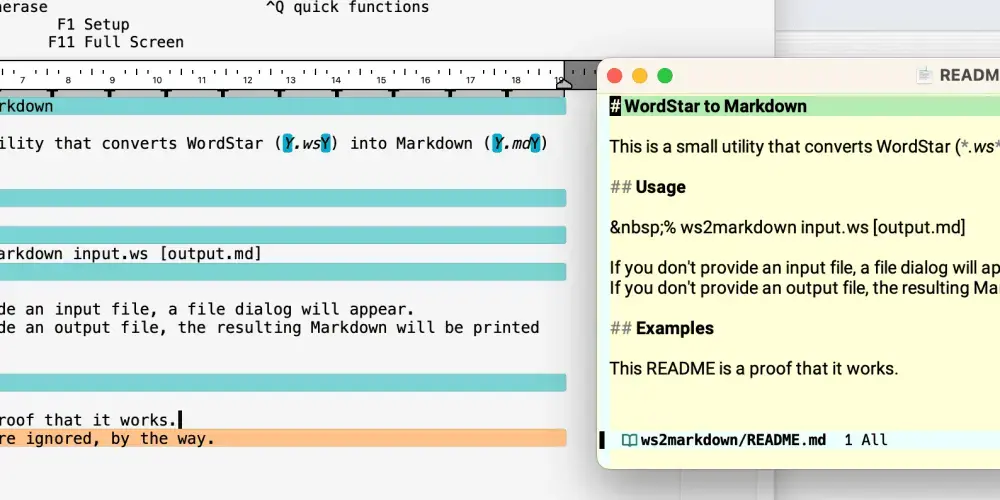rhabarba
Runterwählen ist kein Gegenargument.
[Verifying my cryptographic key: openpgp4fpr:941D456ED3A38A3B1DBEAB2BC8A2CCD4F1AE5C21]
- 20 Posts
- 71 Comments
Because it was a shameless copy of SMF which is also great.
OpenBSD:
- does not run systemd
Conclusion: OpenBSD wins
The WTFPL is risky in certain jurisdictions, as it does not have a NO WARRANTY clause.
Do whatever you like with the original work, just don’t be a dick.

 1·9 months ago
1·9 months agoThank you! :-)

 0·9 months ago
0·9 months agoI wonder why I don’t pay for Lemmy.

 57·9 months ago
57·9 months agoThese days, things have greatly improved.
Websites will never change their URLs today.
If you try it, report back. ;-) My current setup is mostly OpenSMTPD & Dovecot, but I’m open for good reasons to move away.
Websites do not have the functionality to connect to mail servers. These are different protocols.
For mail server infrastructure, Stalwart is said to be pretty good. I haven’t had a chance to try it yet.

 11·10 months ago
11·10 months agoMy RSS reader (Newsblur) lets me do that too, to some extent.

 11·10 months ago
11·10 months ago- Stopped using reddit, went here instead.
- Intensified my Mastodon usage, winding down my Twitter activity.
- Started using my own mail server for more than just a few tests.
- Changed search engines a few times (I’ll probably stick with Kagi now).
- Reduced my subscriptions and cleaned up my RSS feeds.
- Stopped doomscrolling (I subscribed to a weekly paper newspaper instead).
- Started using Ulysses for writing. Works very well.

 7·11 months ago
7·11 months agoGood. Vapers look like clowns with a flute.

 12·1 year ago
12·1 year agoTouché.

 12·1 year ago
12·1 year agoVirtually every website out there today uses Javascript.
Most of those work without it.
Lemmy uses Javascript.
Lemmy is one of several ActivityPub-capable applications. You do not need to use Lemmy inside a web browser in order to participate here. In fact, you don’t even need to use a web browser.
The Web generally does not function without Javascript today.
I disagree. Some websites (with lazy developers) work less well without JavaScript. You’ll gain less annoyances (no JS = no pop-ups and no sophisticated anti-adblock techniques), more speed, less energy consumption, less potential security risks. You’ll lose… not really much. “Web applications” (usually worse, slower and less reliable than installed software), a couple of websites which are very focused on providing effects over contents - sounds like a fair deal to me, but again, YMMV.
Yes, there will never be absolute security. If it runs on a computer, it most likely has security flaws.

 39·1 year ago
39·1 year agoI probably said “Windows” once too often (= once).

 13·1 year ago
13·1 year agoAre you advocating for some form of isolation? If so, what?
Kernel sandboxing. I mean, breaking out of browser “sandboxes” is a game these days.
Any site you browse to – including those not labeled as such – could well expose you to that vulnerability.
Which is why using the web without JavaScript is a security measurement which I strongly recommend to enable. Sure, many sites will be “less interactive” then, but I’m afraid that it is the only solution. For the usually: rather small number of websites which you absolutely need to use with JavaScript enabled (do you, really?), a separate browser inside a container (or VM) would be a good option. I admit that this is not the most comfortable setup, but I really prefer to be safe than sorry. YMMV, but you asked.

 321·1 year ago
321·1 year agoLinux is probably not the wisest choice for gaming - that would still be Windows. Anyway, the distribution does not matter that much. You can install most Linux and cross-platform software on most distributions. Do not choose your system because of what comes as the default desktop, default package set et cetera. Try a few ones. Read some reviews.
















I guess you use blob-free Linux-libre then?